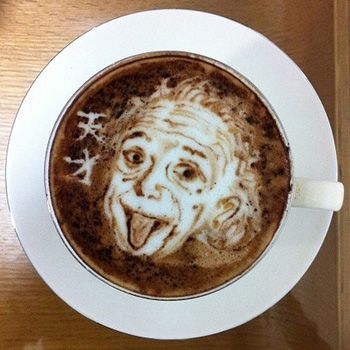If we see college students with sleepy eyes, surrounded by cups of coffee or bottles of energy drinks used to fuel them up for late night study may not represent a good study habit but there drink selection may give them a perimeter as the caffeine in their beverage is a memory enhancer and will boost their memory for long term.
Positive effects of caffeine on long-term memory have been shown in a study analyzing regular caffeine intake through coffee or tea in addition to consuming other substances. By performing several cognitive tasks the researchers observed the positive effect on cognitive processes.
-
They presented words to two groups of people; one who were moderate to high habitual caffeine intake (approx 710mg per week) and second to those who had low habitual caffeine intake (approx 178mg per week). In result they found more successful delayed recall of words by those who had high caffeine intake as compare to those who had low caffeine intake. Therefore, better performance in long-term memory was revealed with increased habitual caffeine intake due to better storage or retrieval.
-
Another study does by showing pictures of different objects to ask them as those pictures are indoor or outdoor items “or "outdoor" items. After that they give 200 mg of caffeine in form of pill or a placebo tablet to some of the participants. On the next day those pictures as well as some new pictures were again shown to participants and asked them to identify those pictures, are those pictures “new”, “old” or “similar” to the original pictures.
The result showed that 200 mg caffeine can enhance memory. I mean they found that those participants who took caffeine were better at identifying those pictures which were same, as compared with participants who used the placebo. However, both groups were capable to correctly distinguish whether pictures were old or new.
-
Another test was taken by researchers to check improvement of long-term memory with caffeine intake used by rats and a water maze. They give caffeine to rats before and after the training sessions and then found that before training session there were no effect of caffeine consumption were seen.
But there was no effect of caffeine consumption before the training sessions. However, a better effect was seen at a low dosage instantly afterward. They conclude that the rats were able to find the platform quicker when caffeine was consumed after the training sessions rather than before. This test implies that memory gaining was not affected, while increases in memory maintenance were.
After so many studies now everyone will get curious that which drinks contains caffeine to boost their long term memory. You may get caffeine from coffee, soft drinks and tea either green tea or black one. Study suggests that consumption of 200 mg of caffeine from “coffee” a day will boost long-term memory.
They came to the point that after experiment of using 100 mg and 300 mg doses of caffeine that performance was better after the 200 mg dose, in comparison of 100 mg dose, but there was no upgrading after the 300 mg of caffeine, compared with 200 mg. Moreover you can get caffeine from “anti oxidant green tea which contain 25 mg caffeine, flavored iced tea with black leaves which contains 40 mg caffeine, green coffee energy beverage containing 50 mg caffeine, coco cafe vanilla (coconut water contain latte) which provides 120 mg caffeine.
But it is not all good reports. One study tells that its regular and huge amount of consumption can disturb or disrupt sleep patterns hours. Moreover, taking caffeine from energy drinks may change heart function, can make you fat or can make you addict of it. So it’s better to consume caffeine but in small proportion (200 mg) but amount of caffeine can vary with different age groups too. The amount of taking caffeine cannot get exceed from 300 mg.
Many research studies proved and suggested to take caffeine as it has many health benefits. It shows that taking caffeine after learning session can boost your long term memory.



